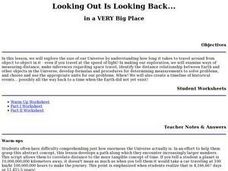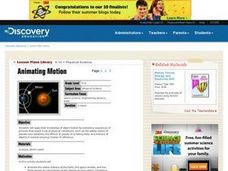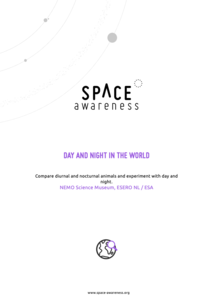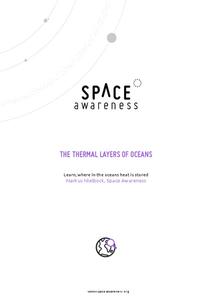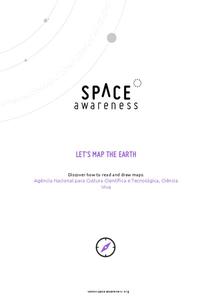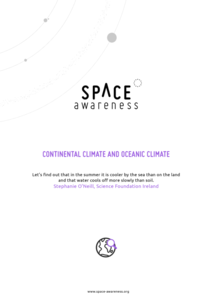Curated OER
Nature of Meteor Showers
Ninth graders describe, in general terms, the distribution of matter in space and
identify evidence for, and describe characteristics of, bodies that make up the solar system. They then investigate predictions about the motion,...
Curated OER
After 7 years, capsule of comet dust heads to Earth
Students examine an article on a space capsule and explore NASA. In this space exploration instructional activity students brainstorm the pros and cons of space exploration, then rehearse a sketch and present it to the class.
Curated OER
Exploration
Young scholars are engaged in a research project about the planet Saturn. The learners use research skills in books and on the internet to gather information for an imaginary trip to the planet. This lesson is highly engaging because of...
Curated OER
Mother Earth - Father Sky
Third graders research and write about Cyrus Dillan. They explain one of Dillan's sculptures. Students locate six constellations and two planets. They research and write about the daily life of the Pawnee.
Curated OER
Retrograde Motion
Students study the motions of the heavenly bodies. In this space lesson students use models to show a variety of schemes explaining the motions.
Curated OER
North American Explorers
Sixth graders discuss famous explorere then research an explorer, collect reference materials and take notes using notecards. They write a three to four page typed and double spaced report then present their findings to the class.
Curated OER
Looking Out Is Looking Back...
Students explore the size of our Universe by understanding how long it takes to travel around from object to object in it - even if you travel at the speed of light! In making our exploration, we will examine ways of measuring distance,...
Curated OER
Animating Motion
Young scholars apply what they recall about objects in motion by animati ng sequences of pictures that model a set of physical conditions. They animate the orbital motions of the Earth, the space shuttle, and the Moon based on...
Curated OER
Climate in the Western Regions
Students examine the interactions of the Earth's systems and other objects in space. In this climate change lesson students study the pros and cons of different climates and what their preferences are.
Curated OER
Make Way for Wild Migrants
Learners discuss the threats facing migratory species and track the seasonal journeys of wildlife in real space and in cyberspace. Once they have gathered information from several sources, they create a portfolio to share with others...
Space Awareness
Greenhouse Effect
A greenhouse provides additional warmth and protection to the plants inside, but what if the greenhouse gets too hot? Pupils discuss and experiment with the difference between natural and anthropogenic greenhouse effect. They measure the...
Space Awareness
Sun, Earth and Moon Model
The moon orbits Earth while the Earth is rotating, and the Earth revolves around the sun. This can be a tricky concept for young astronomers. Implement an activity that helps distinguish between the movements of Earth's systems around...
Space Awareness
Day and Night in the World
How do different parts of the world experience day and night? Introduce scholars to the concept of global citizenship while teaching about animal behavior with discussion of nocturnal and diurnal animals. Then, learners complete...
Space Awareness
The Big Meltdown
Explore the world (our world) of melting ice caps. Why are these caps melting? What is the effect of melting ice caps? Dive into the ever-present issue of global warming with a resource that has learners looking at data and participating...
Space Awareness
The Thermal Layers of Oceans
How much does the sun heat up a lake or ocean? Scholars use a cup and a strong lamp to investigate the heat transfer and thermal layers in the ocean to come up with the answer. They collect data and graph it in order to better understand...
Space Awareness
Oceans on the Rise
Temperature rises and land disappears! Through a lab exploration, learners understand the effect of temperature increase on water similar to the effect of global warming on our oceans. As they heat the water in a flask, they measure the...
Space Awareness
Water is a Heat Sink
One of the key objectives of Europe's Copernicus Earth program is to monitor the temperatures of the oceans and seas on Earth. Young scholars learn the effects of different heat capacities through two experiments. These experiments...
Space Awareness
Let's Map the Earth
Before maps went mobile, people actually had to learn how to read maps. Pupils look at map elements in order to understand how to read them and locate specific locations. Finally, young cartographers discover how to make aerial maps.
Space Awareness
What is Time?
Does it ever seem like time is slipping through your fingers? Model the passing of time with an hourglass activity in which individuals determine whether hourglasses are the most efficient way to measure time.
Space Awareness
Climate Zones
The climate at the equator is hotter than the climate at the poles, but why? The lesson plan goes in depth, explaining how the angles of illumination relate to the heating rate at different latitudes and seasons. Scholars use a strong...
Space Awareness
The Climate in Numbers and Graphs
Weather versus climate: weather relates to short time periods while climate averages the weather of a period of many years. Scholars learn about average temperature and precipitation in various climate zones and then apply statistics...
Space Awareness
Valleys Deep and Mountains High
Sometimes the best view is from the farthest distance. Satellite imaging makes it possible to create altitude maps from far above the earth. A three-part activity has your young scientists play the role of the satellite and then use...
Space Awareness
Continental Climate and Oceanic Climate
There's nothing better than a cool breeze blowing in from the ocean. Scholars explore how water affects change in temperature using a hands-on experiment on climate. They use measurement tools to compare the continental and oceanic...
Space Awareness
Ocean Acidification
Learn the science behind ocean acidification and its effects on ocean wildlife. Young scientists conduct a laboratory investigation that monitors the acidity level of water. While burning a candle, learners capture the carbon dioxide in...
Other popular searches
- Planets Outer Space
- Science Space and Planets
- Outer Space Outer Planets
- Poetry Space and Planets
- Planets and Space
- Space Planets Scale
- Space and Planets Practical








